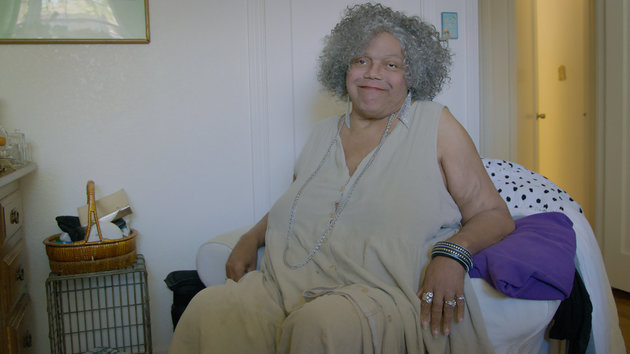KJIPUKTUK (Halifax) – Transgender Day of Visibility (March 31) unleashed a predictable flurry of memes and videos across social media, above all, one which spoke to me.
Miss Major Griffin-Gracy is an icon of the trans rights movement. Miss Major pioneered services for trans people incarcerated in the prison-industrial complex. She was an early and visible trans activist, assaulted by police during the Stonewall riots, chased from the stage with Sylvia Rivera during a now-legendary transphobic backlash at a 1973 NYC gay rights rally. Few can speak with her experience and authority.
Wryly noting that “our visibility is getting us killed”, Miss Major directed her comments to our friends and allies.
“The people who care about us, who are involved in our lives, and who know us, they’re the people who need to become more visible,“ she said. “They need to acknowledge that we exist, claim and show they support us…They need to stop supporting us from the shadows, step out into the light, and say, ‘I appreciate, acknowledge and like transgender people’…Tell a transgender person that you appreciate them, acknowledge that you like them in public, to your friends, to your co-workers, to your damn family. Don’t keep us in the dark, on the side in some secret little place in your mind. Step out, acknowledge who we are to you, and appreciate us like that.”

Miss Major dropped some serious truth. It’s difficult to say that without feeling like I’m about to criticize my friends. Actually, I’m about to make excuses for them.
The more time goes on, the less typical a trans person I am. I know this. I turned sixty this year, only the seventh year in my life that I have lived openly in my gender. Coming out when I did, in tandem with a trans awakening in this province, I was offered and found both refuge and community among those a generation or two younger than me. In the future, there won’t be people like me, hiding in closets for decades – we will come out when we are young into a world that can understand and accommodate us.
It so happens that in my case, I left most of my friends, along with the life I’d built, in the past, so the smallness of my circle is amplified by the lack of what, in most people’s lives, is a larger context for their current set of friends. It’s remarkable to me that I am included as I am by friends who are so much younger, I stand out as unusual even to myself. I can’t really imagine what it is like for them. Except that I get that it’s kind of like having Mom around. Or Dad – which makes me think it’s probably a little of both, if we were really honest. If we were close enough to really talk about it.
So, it’s not surprising to me that I am included in activities of membership-based groups, like arts collectives for example, while at the same time not included in the circles of friends which may form in those spaces. My friendships with cis people are overwhelmingly limited to one-on-one affairs, even if those friends form a circle of their own. I find I am seldom invited to be part of group or weekend outing activities. I’ve always attributed this to my age. I get that intergenerational friendships are less common in urban communities than they are in the country, where I lived before I came out. I also see how my relative lack of fluency in contemporary queer culture – essentially, how to hang out as a queer woman – makes hanging out with me inherently awkward, and I think that influences my inclusion among queer cis women, as well. Finally, I experience the economic disenfranchisement so pervasive among both trans people and older workers– we are mostly un- and under-employed – with fewer opportunities to participate socially without being burdensome. These dimensions may add up as barriers to my inclusion, but age mostly explains them for me. I don’t even have to go to being trans to account for it, and so I don’t regard what I experience as trans exclusion.
Yet, there remains something resonant in Miss Major’s challenge to the people “who are involved in our lives.”
The fact is, despite my caveats, my experience is echoed by other trans people I know across an age spectrum, and trans women in particular. Their cis friendships are one-on-one. They weren’t invited on the group outing or didn’t hear about the outre queer dance of their friends’ weekend Instagram posts. Nobody they know with a car ever takes them anywhere but the odd errand. It often seems like individuals connect but transgender and cisgender cultures have yet to really mingle, and it impedes us sharing our larger lives.
It’s often more acute for trans women. Many trans men and people who are non-binary came out first as queer and later as trans in the supportive realms of queer women spaces, they share the myths and secrets of the culture, they share the acquired fluency in navigating the scene. After coming out, they can choose to retain the access and ease of movement they previously experienced in queer spaces. In contrast, many trans women lack a parallel cultural fluency and with it, currency, or mobility. This is especially so of middle-aged or older trans women, amplified by the attitudes of our age peers, which aren’t always given to mentorship. That’s an oblique way of saying a certain transphobia persists among many well-meaning queer elders.
For example, in recounting incidents of transphobia or just plain difficult men, I am more likely to be dismissed by my cis queer age peers than affirmed. “Oh,” (exasperated sigh) “You think that’s hard? We’ve been dealing with that for years.” On the face of it, I’m being told I’m oversensitive. The implicit reminder I am not cis – the ‘we’ to mean ‘cis women’ – causes me to realize, though, that if I am accepted as a woman at all, it comes with qualifications to set me apart. It’s a message I hear other trans woman my age say they get from our queer age peers, all the time, too. Minimizing our concerns so as to minimize our womanhood. I spend a lot of time educating, cajoling my age peers – pioneers once, themselves – asking them to challenge their view of what makes one a woman. It’s exhausting – we do the heavy lifting for other people’s learning, and bear a different weight when it doesn’t translate into a change of behaviour.
I am sincere and grateful in the friendships I have been able to cultivate, I feel blessed, and I strive to be reciprocal. At the same time, I really do not know how my friends conduct themselves as my ally. I know when I’m in their presence. But when I’m not there, I don’t really know.
It’s a restatement of the tree-falling-in-the-forest quandary. If I’m not around, do my friends call out transphobia, do they correct misgendering, do they question exclusion? I’d like to think they do. I like the notion of an ally so strong in what they do I don’t need to see it to trust it’s there. The truth is more a question mark for me.
I know sometimes I opt out of asserting my rights. I let my mechanic call me “Bub” because it costs less than pissing him off. Sometimes, I can’t afford to fight. I don’t know that it’s fair to hold others to a higher standard.
For me, however, it’s 24/7; I can defer, but I can’t walk away. I’m always trans. In contrast, an ally can choose to walk away from it from time to time. That shouldn’t compromise their status as an ally, necessarily. But where do you draw the line? At what point does walking away compromise allyship?
Lately I’ve encountered, in several works intended to be trans-positive, advice to cis allies to be aware of circumstances, and to consider in advance whether it is a situation their trans friend will find comfortable. If it seems like it’s going to be unsafe, it probably will be.
I know advice like this is well-intentioned, but I think it misses the mark a few times over. First, if the atmosphere is transphobic, what are my allies even doing there, if they’re not fighting against it? Second, it’s up to me to decide if a situation is bearable for me or not. Personally, I’d like the dignity of that choice. I need to emphasize that not everyone would say that, or agree. Finally, it is altogether too easy for someone to decide a situation isn’t right for their trans friend, then go ahead and enjoy it themselves without having to navigate the awkwardness of a trans companion in a cisgender scene. To walk away, in effect. Ostensibly avoiding an awkward situation for us can be an excuse for deliberately leaving us behind. We will never know the truth and we will always wonder.
The UN Universal Declaration of Human Rights established three principles for marginalized people: equality, self-determination, and full participation in society. That latter phrase is what inclusion looks like, whether it’s for trans people, or people of colour, or anyone on any dimension or intersection of exclusion or oppression. Full participation in society is when you don’t need allies, anymore. The message Miss Major delivered is, we are not there, yet.
That I and my trans peers harbour our own private doubts about the extent of the allyship we enjoy even among our closest friends underscores Miss Major’s assertion that it is time for “The people who care about us, who are involved in our lives, and who know us… to become more visible.”
Laura Shepherd is a trans parent, writer and worker living and working in Halifax.

With a special thanks to our generous donors who make publication of the Nova Scotia Advocate possible.
Subscribe to the Nova Scotia Advocate weekly digest and never miss an article again. It’s free!



